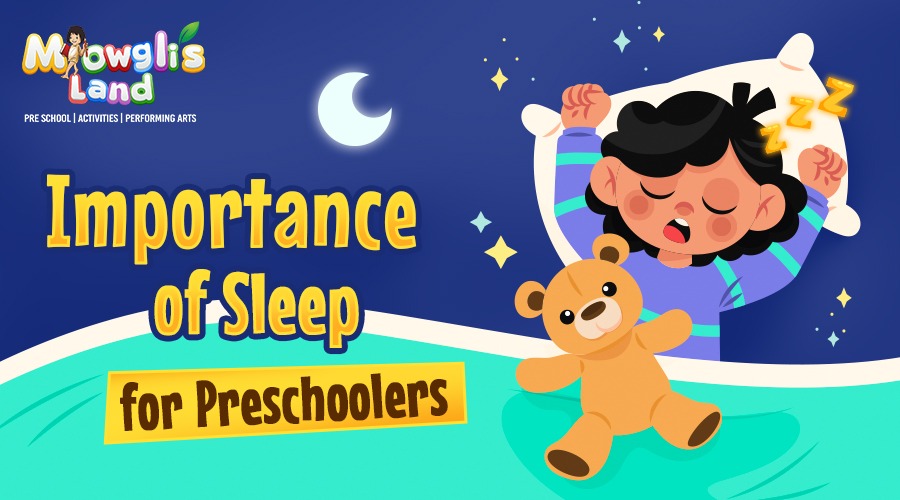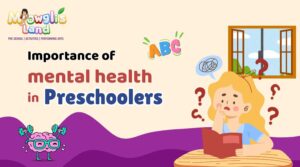Do you know How important is sleep for preschoolers?
Sleep is essential for everyone, but it’s especially crucial for preschoolers. At this age, children are growing rapidly, both physically and mentally. The importance of sleep plays a significant role in their overall development, helping them to grow strong, think clearly, and stay healthy in the long run. The best practices to understand the importance of sleep could be achieved at the Best preschool in Bhopal.
In this blog, we will discuss various factors that revolve around the importance of sleep for growing kids!
Why is Sleep Important for Preschoolers?
Sleep plays a crucial role in the overall development of preschoolers. Be it emotional, mental, or physical. Here are some factors that are affected by the amount of sleep intake your toddler takes:
1. Physical Growth
Studies reveal that children who get enough sleep are more likely to grow at a healthy rate. This is possible because, during sleep, a child’s body releases growth hormones that are vital for their physical development. These hormones help with muscle growth, tissue repair, and overall physical development.
2. Brain Development
Sleep is when the brain processes everything a child has learned during the day. It helps to solidify memories and improve cognitive abilities. For preschoolers, this means better problem-solving skills, creativity, and the ability to learn new things.
3. Emotional well-being
A well-rested child is generally happier and more emotionally stable. Lack of sleep can lead to mood swings, irritability, and even anxiety. Consistent sleep helps kids manage their emotions better and cope with everyday challenges.
4. Strengthens Immune System
Sleep boosts the immune system, making it easier for children to fight off illnesses. Preschoolers who get enough sleep are less likely to catch colds, flu, and other common illnesses, allowing them to enjoy their day-to-day activities without frequent interruptions.
5. Improves Attention and Behavior
Toddlers who don’t get enough sleep may have trouble paying attention, following directions, and controlling their impulses. This can affect their behavior at home and in the preschool curriculum. Adequate sleep helps them stay focused, follow instructions, and behave appropriately.
How Much Sleep Do Preschoolers Need?
The National Sleep Institute recommends these hours of sleep to preschoolers and adults:
- 12–17 hrs. for newborns and infants
- 11–14 hrs. for ages 1–2 yrs.
- 10–13 hrs. for ages 3–5 yrs.
- 9–11 hrs. for ages 6–13 yrs.
- 8–10 hrs. for ages 14–17 yrs.
- 7–9 hrs. for adults
The amount of sleep helps to ensure that they are getting enough rest to support their rapid growth and development in early education.
Scientists are still working to identify and clarify the functions and importance of sleep. Many researchers have used the method of disrupting sleep and examining the consequences of the same. Later, they confirmed that sleep is necessary for the healthy functioning and survival of the body.
Also read: Mowgli’s Land: Premier Preschool in Bhopal
Tips for Establishing Good Sleep Habits
Below are some useful tips that contribute to establishing good sleep for good health habits in your preschooler:
1. Create a Consistent Bedtime Routine
A consistent bedtime routine helps signal your child that it’s time to sleep or take a quick nap to recharge themselves. This routine could include a warm bath, brushing teeth, and reading a bedtime story. Consistency is key to helping your preschooler understand when it’s time to go to bed.
2. Keep a Regular Sleep Schedule
Try to put your child to bed and wake them up at the same time every day, even on weekends. This helps regulate their internal clock and makes it easier for them to fall asleep and wake up naturally.
3. Create a Sleep-Friendly Environment
Make sure your child’s bedroom is quiet, dark, and comfortable. Consider using soft lighting, a comfortable mattress, and cozy bedding to make the room inviting for sleep. Reducing noise and light can also help your child stay asleep through the night.
4. Limit Screen Time Before Bed
Exposure to screens before bedtime can interfere with your child’s ability to fall asleep. Avoid letting your preschooler watch TV, or use any electronic devices at least an hour before bed. Additionally, they should also be prevented from any smartphone addiction.
5. Encourage Physical Activity
Kindergarteners have a lot of energy, and physical activity during the day can help them sleep better at night. Encourage your child to play outside, run around, and be active, but try to avoid high-energy activities right before bedtime.
6. Watch Their Diet
Avoid giving your child large meals, sugary snacks, or caffeine close to bedtime. These can make it harder for them to settle down and fall asleep. Instead, offer a light snack, like a small bowl of cereal or a piece of fruit if they’re hungry before bed.
Conclusion
Sleep is vital for preschoolers to survive in their preschool curriculum as it supports their physical growth, brain development, emotional well-being, and overall health. We at Mowgli’s Land would help your little ones establish good sleep habits early on so that they can set the foundation for a lifetime of healthy sleep patterns.
By ensuring your little one gets enough rest, you’re helping them grow into strong, healthy, and happy individuals!




